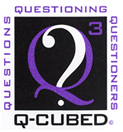The vast and growing literature on science education and inquiry-based learning offers valuable insights for creators and practitioners in the world of medical ignorance using the approach of questions, questioning and questioners (Q-cubed).
Included below are several books and web sites where you might want to begin the voyage of discovery. The books can be found on the web site of the National Research Council and contain extensive bibliographies.
1. National Research Council, National Science Education Standards,
Washington, DC: National Academy Press, 1996.
2. National Research Council, Inquiry and the National Science
Education Standards: A Guide for Teaching and Learning, Washington, DC: National Academy Press, 2000.
3. National Research Council, Knowing What Students Know: The Science
and Design of Educational Assessment, Washington, DC, National Academy
Press, 2001.
4. National Research Council, How People Learn: Brain, Mind, Experience, and School, Washington, DC, National Academy Press, 2000.
LINKS
www.ncrel.org/sdrs/areas/issues/content/cntareas/science/sc500.htm
www.miamisci.org/ph/lpintro5e.html
www.biopoint.com/inquiry/ibr.html
www.biology.duke.edu/cibl/
(Center for Inquiry-Based Learning, Duke University)
www.accessexcellence.org/
(The National Health Museum) contains useful links for health and bioscience teachers including opportunities for discussions with K-12 classroom teachers and scientists/physicians.
www.learner.org/resources/resource.html
(Annenberg/CPB Resources, "Learning Science Through Inquiry," promotes a video workshop for K-8 teachers, video programs, workshop guide, and web site.)

